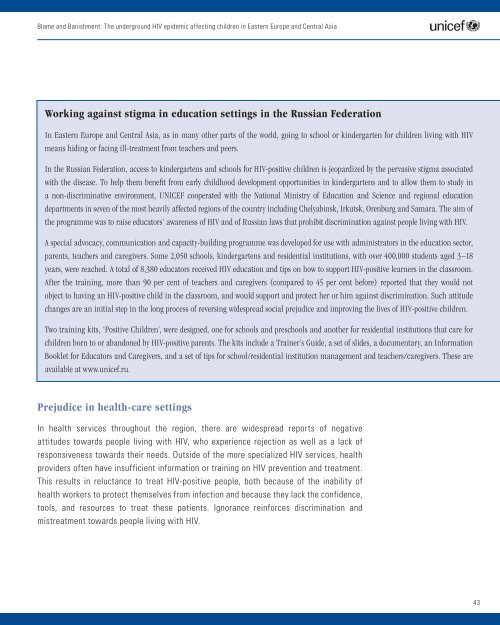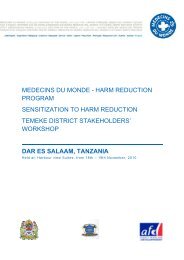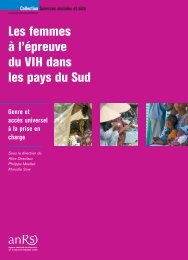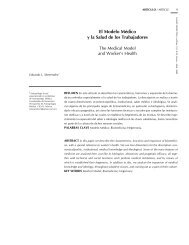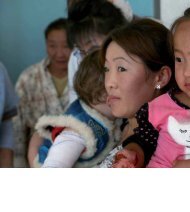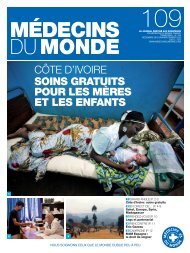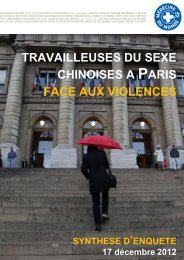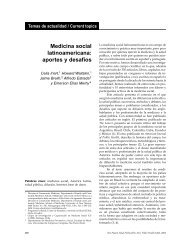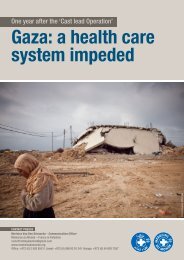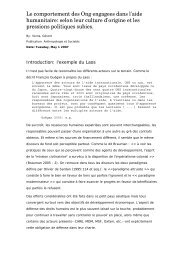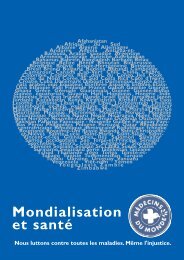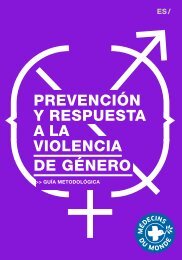Blame & Banishment - Médecins du Monde
Blame & Banishment - Médecins du Monde
Blame & Banishment - Médecins du Monde
You also want an ePaper? Increase the reach of your titles
YUMPU automatically turns print PDFs into web optimized ePapers that Google loves.
<strong>Blame</strong> and <strong>Banishment</strong>: The underground HIV epidemic affecting children in Eastern Europe and Central Asia<br />
Working against stigma in e<strong>du</strong>cation settings in the Russian Federation<br />
In Eastern Europe and Central Asia, as in many other parts of the world, going to school or kindergarten for children living with HIV<br />
means hiding or facing ill-treatment from teachers and peers.<br />
In the Russian Federation, access to kindergartens and schools for HIV-positive children is jeopardized by the pervasive stigma associated<br />
with the disease. To help them benefit from early childhood development opportunities in kindergartens and to allow them to study in<br />
a non-discriminative environment, UNICEF cooperated with the National Ministry of E<strong>du</strong>cation and Science and regional e<strong>du</strong>cation<br />
departments in seven of the most heavily affected regions of the country including Chelyabinsk, Irkutsk, Orenburg and Samara. The aim of<br />
the programme was to raise e<strong>du</strong>cators’ awareness of HIV and of Russian laws that prohibit discrimination against people living with HIV.<br />
A special advocacy, communication and capacity-building programme was developed for use with administrators in the e<strong>du</strong>cation sector,<br />
parents, teachers and caregivers. Some 2,050 schools, kindergartens and residential institutions, with over 400,000 students aged 3–18<br />
years, were reached. A total of 8,380 e<strong>du</strong>cators received HIV e<strong>du</strong>cation and tips on how to support HIV-positive learners in the classroom.<br />
After the training, more than 90 per cent of teachers and caregivers (compared to 45 per cent before) reported that they would not<br />
object to having an HIV-positive child in the classroom, and would support and protect her or him against discrimination. Such attitude<br />
changes are an initial step in the long process of reversing widespread social prejudice and improving the lives of HIV-positive children.<br />
Two training kits, ‘Positive Children’, were designed, one for schools and preschools and another for residential institutions that care for<br />
children born to or abandoned by HIV-positive parents. The kits include a Trainer’s Guide, a set of slides, a documentary, an Information<br />
Booklet for E<strong>du</strong>cators and Caregivers, and a set of tips for school/residential institution management and teachers/caregivers. These are<br />
available at www.unicef.ru.<br />
Prejudice in health-care settings<br />
In health services throughout the region, there are widespread reports of negative<br />
attitudes towards people living with HIV, who experience rejection as well as a lack of<br />
responsiveness towards their needs. Outside of the more specialized HIV services, health<br />
providers often have insufficient information or training on HIV prevention and treatment.<br />
This results in reluctance to treat HIV-positive people, both because of the inability of<br />
health workers to protect themselves from infection and because they lack the confidence,<br />
tools, and resources to treat these patients. Ignorance reinforces discrimination and<br />
mistreatment towards people living with HIV.<br />
43


